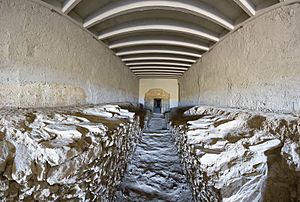Dolmen de la Pastora facts for kids

Entrance to the Dolmen
|
|
| Alternative name | Cueva de la Pastora |
|---|---|
| Location | Seville |
| Coordinates | 37°24′47″N 6°03′52″W / 37.41319°N 6.06444°W |
| Type | Dolmen |
| History | |
| Periods | Bronze Age |
The Dolmen de la Pastora (also known as Cueva de la Pastora) is a very old burial site in Valencina de la Concepción, a town near Seville, Spain. It is a type of ancient tomb called a passage grave. People built it during the Chalcolithic Age, which was a time when people started using copper tools. This was long before the Bronze Age.
Contents
What is the Dolmen de la Pastora?
The Dolmen de la Pastora is hidden under a large mound of earth called "La Pastora." It is a long tunnel, about 43 meters (141 feet) long. The walls of this tunnel are made from drystone, which means stones are stacked without mortar. The roof is made of big, flat stones of limestone and granite.
The Burial Chamber
At the very end of the long tunnel, there is a round room. This room is a burial chamber, about 2.5 meters (8 feet) wide. A single, huge piece of granite forms the roof of this chamber. This large stone is called a capstone.
Facing the Sunset
Most ancient tombs like this in the area face towards where the sun rises. But the Dolmen de la Pastora is different. Its entrance faces towards where the sun sets. This might have had a special meaning for the people who built it.
What Was Found Inside?
In 1860, people explored the mound around the dolmen. They found 27 copper arrowheads. These arrowheads were shaped like javelins, which are light spears. Finding these items helps us learn about the people who lived here long ago.
Gallery
See also
 In Spanish: Dolmen de la Pastora para niños
In Spanish: Dolmen de la Pastora para niños
- Prehistoric Iberia
- Antequera Dolmens Site
- Tholos de El Romeral
- Bell Beaker culture







